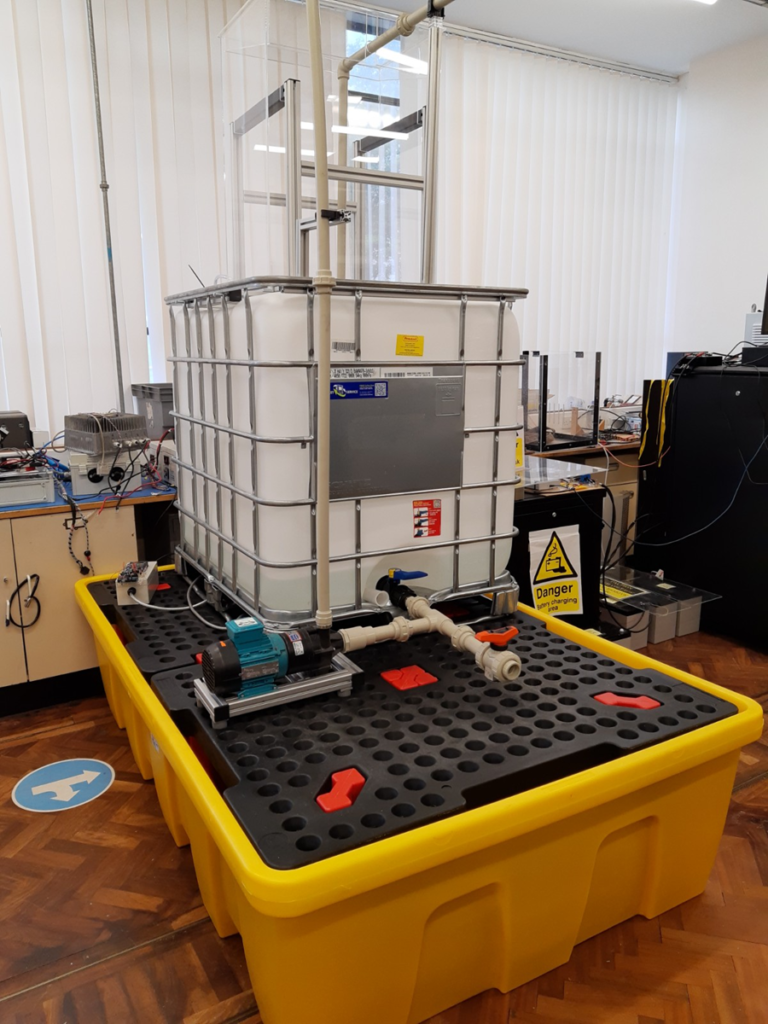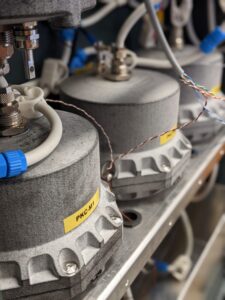Batteries for Emerging Economies. Details of Completed Projects
RELCo-Bat: Reclaimed Electrolyte, Low Cost Flow Battery

Prof Richard Wills from the University of Southampton led the RELCo-BAT project team that also included researchers from the University of Sheffield. The project made progress towards developing a low-cost, soluble lead flow battery to promote grid stability and a secure, clean supply in off-grid electricity generation.
A unique advantage of the battery system is its potential to use recycled conventional automotive lead acid batteries for its manufacture, thereby creating a local supply chain and servicing capability, providing wider potential benefits through the creation of a new, sustainable value chain.
The team developed a novel new design for flow battery that overcomes previous issues and that shows improved voltaic efficiency. However, further Coulombic and energy efficiencies are required. Researchers have also been successful in securing a higher quality electrolyte for use in the system. A 1 kW prototype has been developed and the unit, once built into a small shipping container, will be tested at a site near the university.
The team also published a techno-economic assessment to guide system design and fast-track best approaches to aid cost reductions.
Low-cost graphite polysulphide single liquid flow battery for emerging economies
Edinburgh-based battery innovator StorTera collaborated with researchers from the University of Strathclyde to refine and cost engineer their innovative graphite polysulfide single liquid flow battery.
The Electrochemical Engineering group at Strathclyde, led by Dr Edward Brightman, refined the system design and improved the electrolyte and electrode materials chemistry while reducing costs and considering use of more sustainable materials. They also investigated the influence of the graphite current collector and separator types on the cell performance. Researchers demonstrated a reduced catholyte cost of 50% and reduced production costs of 50-70%, leading to an overall reduction of >20% in upfront costs of the system (to £70/kWh), and a 20% increase in durability, albeit at small scales.
StorTera built a prototype system incorporating Strathclyde’s system improvements, which was tested at PDNC. The system demonstrated >99% round trip efficiency on charging/discharging in a 15W/20Wh configuration. Though successfully tested, the prototype is small, and the challenge for StorTera is now to demonstrate that its technology works at much larger scales. The company has subsequently secured £5m of funding from the UK Government’s Net Zero Innovation Portfolio (NZIP), which will support the development of a long-lasting megawatt scale battery that can operate for up to eight hours.
In parallel, a team from Strathclyde’s Energy for Development group carried out a techno-economic modelling study, surveying stakeholders in Malawi and Zimbabwe about how the technology will be used and their requirements. This found that the liquid flow batteries can achieve cost savings of 20-50% over lithium-ion and lead acid chemistries when used in micro grids.

Principal Investigator Dr Edward Brightman met James Cleverly, Secretary of State for Foreign, Commonwealth and Development Affairs, at a visit to Strathclyde University, November 2022.
Advanced manufacturing of 3D porous electrodes for redox flow batteries
Professor Ana Jorge Sobrido of Queen Mary University of London led a project with UCL and collaborators in Canada that had the aim of overcoming engineering issues that are currently preventing the wide-spread adoption of redox flow batteries (RFBs). Researchers attempted to combine two flexible, scalable manufacturing methods, 3D printing and electrospinning, to develop an innovative concept of 3D electrodes with the aim of optimising mass transport and electrochemical properties. Four scientific papers have been written associated with the project, including in the Journal of Power Sources and Current Opinion in Chemical Engineering.
Device engineering of zinc-based hybrid microflow batteries and by-product hydrogen collection for emerging economies
Researchers at UCL collaborated with partners in China and India to build on innovations in individual components of zinc-based hybrid batteries. It is developing a novel battery architecture for low-cost and high manufacturability that is aiming to solve issues around side reactions and maximising cycle life. The project achieved a bench-scale demonstrator, accelerating a route to a start-up and potential international investment in this low cost, low toxicity, environmentally benign technology. A market analysis of where the technology is best suited points to grid-scale energy storage in developing countries.

